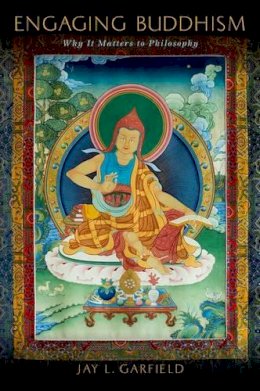
Stock image for illustration purposes only - book cover, edition or condition may vary.
Engaging Buddhism: Why It Matters to Philosophy
Jay L. Garfield
€ 68.66
FREE Delivery in Ireland
Description for Engaging Buddhism: Why It Matters to Philosophy
Paperback. This is a book for scholars of Western philosophy who wish to engage with Buddhist philosophy, or who simply want to extend their philosophical horizons. It is also a book for scholars of Buddhist studies who want to see how Buddhist theory articulates with contemporary philosophy. Num Pages: 400 pages, 10. BIC Classification: HPDF; HRAB; HRE. Category: (G) General (US: Trade). Dimension: 236 x 157 x 27. Weight in Grams: 518.
This is a book for scholars of Western philosophy who wish to engage with Buddhist philosophy, or who simply want to extend their philosophical horizons. It is also a book for scholars of Buddhist studies who want to see how Buddhist theory articulates with contemporary philosophy. Engaging Buddhism: Why it Matters to Philosophy articulates the basic metaphysical framework common to Buddhist traditions. It then explores questions in metaphysics, the philosophy of mind, phenomenology, epistemology, the philosophy of language and ethics as they are raised and addressed in a variety of Asian Buddhist traditions. In each case the focus is on ... Read more
This is a book for scholars of Western philosophy who wish to engage with Buddhist philosophy, or who simply want to extend their philosophical horizons. It is also a book for scholars of Buddhist studies who want to see how Buddhist theory articulates with contemporary philosophy. Engaging Buddhism: Why it Matters to Philosophy articulates the basic metaphysical framework common to Buddhist traditions. It then explores questions in metaphysics, the philosophy of mind, phenomenology, epistemology, the philosophy of language and ethics as they are raised and addressed in a variety of Asian Buddhist traditions. In each case the focus is on ... Read more
Product Details
Publisher
Oxford University Press Inc
Format
Paperback
Publication date
2015
Condition
New
Weight
570g
Number of Pages
400
Place of Publication
New York, United States
ISBN
9780190204341
SKU
V9780190204341
Shipping Time
Usually ships in 15 to 20 working days
Ref
99-25
About Jay L. Garfield
Jay L. Garfield is Kwan Im Thong Hood Cho Professor of Humanities and Head of Studies in Philosophy at Yale-NUS College, Professor of Philosophy at the National University of Singapore, Recurrent Visiting Professor of Philosophy at Yale University, Doris Silbert Professor in the Humanities and Professor of Philosophy at Smith College, Professor of Philosophy at Melbourne University and Adjunct Professor ... Read more
Reviews for Engaging Buddhism: Why It Matters to Philosophy
Garfield's book is a thought provoking and illuminating engagement with (mainly Mahayana) Buddhist thought. The chapters on metaphysics, the self, epistemology and ethics are the most interesting ones ... Another asset of the book is that it moves beyond a mere scholarly discussion of (the history of) Buddhist ideas. Chances are high we will see more books engaging with non-Western ... Read more
